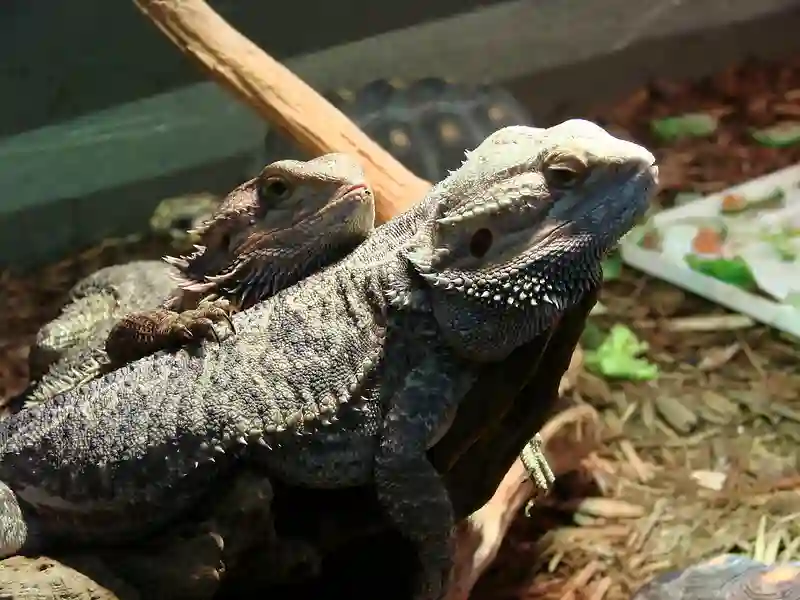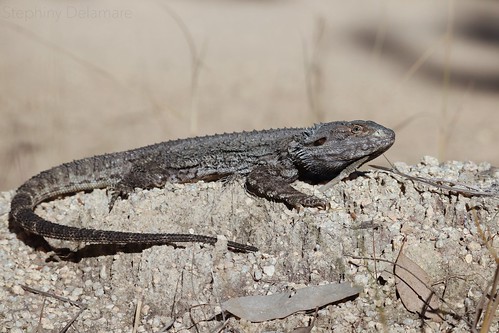Black fungus in a bearded dragon can cause black spots on the skin, which may start as small black dots and quickly grow.
This fungus causes granulomatous dermatitis that often invades muscle and bone, resulting in osteomyelitis and myositis.
There are several treatment options available, including terbinafine, an antifungal medication
In this comprehensive guide, we will cover everything you need to know about black fungus in bearded dragons.
Causes of Black Fungus in Bearded Dragons
Poor Hygiene: One of the primary causes of black fungus in bearded dragons is poor hygiene. An unclean environment can lead to the growth of harmful bacteria and fungi, which can infect your pet. The bearded dragon habitat must be regularly cleaned and maintained to prevent this problem.
Humidity: High humidity levels in the bearded dragon’s enclosure can promote fungal growth. It is crucial to maintain a proper humidity level to prevent the development of black fungus. Aim for a humidity level between 30% and 40% for optimal health.
Weak Immune System: A weakened immune system can make your bearded dragon more susceptible to infections, including black fungus. A well-balanced diet, proper lighting, and regular veterinary check-ups can help maintain a robust immune system.
Symptoms of Black Fungus in Bearded Dragons
- Black or Dark Patches: The most apparent symptom of black fungus is the appearance of black or dark patches on the bearded dragon’s skin. These patches can vary in size and shape and may spread over time.
- Skin Discoloration: In addition to black patches, skin discoloration may occur, including gray or brown areas. These discolored areas can indicate a fungal infection and should be monitored closely.
- Lethargy: A bearded dragon infected with black fungus may exhibit lethargy or a decrease in activity levels.
- Loss of Appetite: A bearded dragon with black fungus may lose its appetite or show a decreased interest in food.
- Skin Shedding Issues: Black fungus can cause irregularities in the shedding process. If your bearded dragon is having trouble shedding or has retained skin, it may be a sign of a fungal infection.
Treatment Options for Black Fungus in Bearded Dragons
Veterinary Consultation: If you suspect that your bearded dragon has black fungus, seek immediate veterinary attention. A veterinarian can diagnose the condition and recommend appropriate treatment options.
Topical Antifungal Medications: Topical antifungal medications, such as creams or ointments, can help treat black fungus in bearded dragons. Your veterinarian will prescribe the appropriate medication based on your pet’s specific needs.
Oral Antifungal Medications: In severe cases, oral antifungal medications may be necessary to treat black fungus in bearded dragons. Your veterinarian will determine the appropriate dosage and duration of treatment.
Improving Habitat Conditions: Proper habitat maintenance is crucial for preventing and treating black fungus in bearded dragons. Ensure the enclosure is clean, well-ventilated, and maintained at the correct humidity level to discourage fungal growth.
Supportive Care: Providing supportive care, such as maintaining proper nutrition and hydration, can help your bearded dragon recover from a black fungus infection. Consult your veterinarian for guidance on supportive care during treatment.
Prevention of Black Fungus in Bearded Dragons
- Regular Cleaning: Keeping the bearded dragon’s enclosure clean is essential for preventing black fungus. Regularly remove waste and uneaten food, and disinfect the habitat with a reptile-safe cleaner.
- Proper Humidity Management: Maintaining appropriate humidity levels in the enclosure is crucial for preventing fungal growth. Use a reliable hygrometer to monitor humidity, and make adjustments as needed to maintain a healthy environment.
- Good Ventilation: Ensuring proper airflow in the bearded dragon’s habitat can help prevent black fungus. A well-ventilated enclosure discourages the growth of harmful bacteria and fungi.
- Balanced Diet: Providing a balanced diet that meets your bearded dragon’s nutritional needs can help maintain a robust immune system. A strong immune system is essential for warding off infections, including black fungus.
- Regular Veterinary Check-ups: Schedule routine veterinary check-ups for your bearded dragon to monitor its overall health. Early detection and treatment of health issues can prevent complications, such as black fungus.
A Veterinarian’s Final Thoughts on Black Fungus in Bearded Dragons
In conclusion, as a veterinarian, I cannot stress enough the importance of being proactive in the care and management of your bearded dragon’s health.
Black fungus is a serious condition that can have lasting effects on your pet’s well-being. However, with proper knowledge, attention to detail, and timely intervention, you can significantly reduce the risk of black fungus infection and ensure your bearded dragon thrives in a healthy environment.
Early detection is crucial in addressing and treating black fungus, so it is essential to monitor your bearded dragon’s skin condition and overall health closely.
Regular veterinary check-ups, a balanced diet, and maintaining a clean, well-ventilated habitat with appropriate humidity levels are all key components in preventing and managing black fungus in bearded dragons.
You can read more from collage of veterinary medicine


